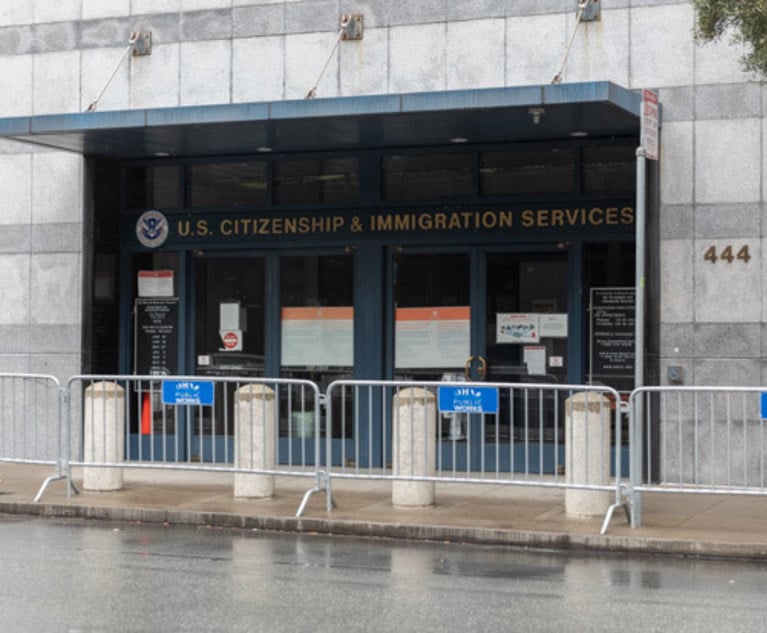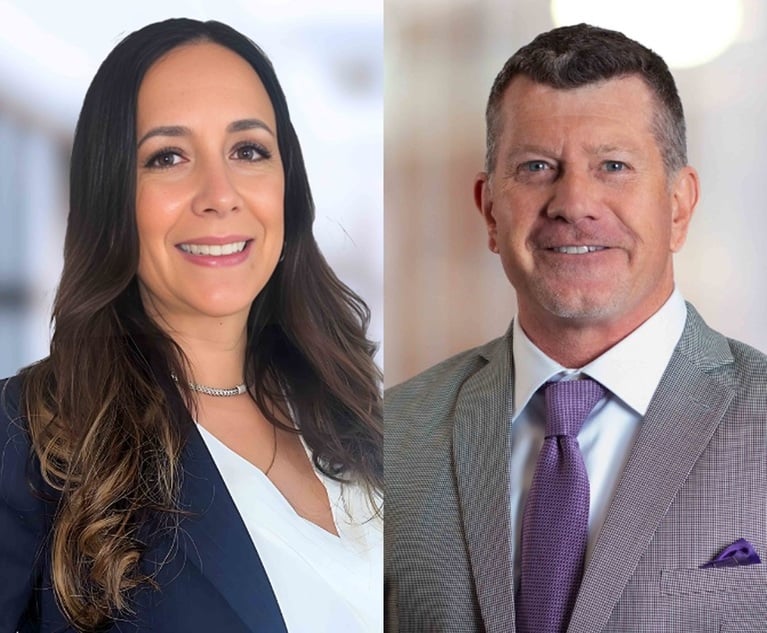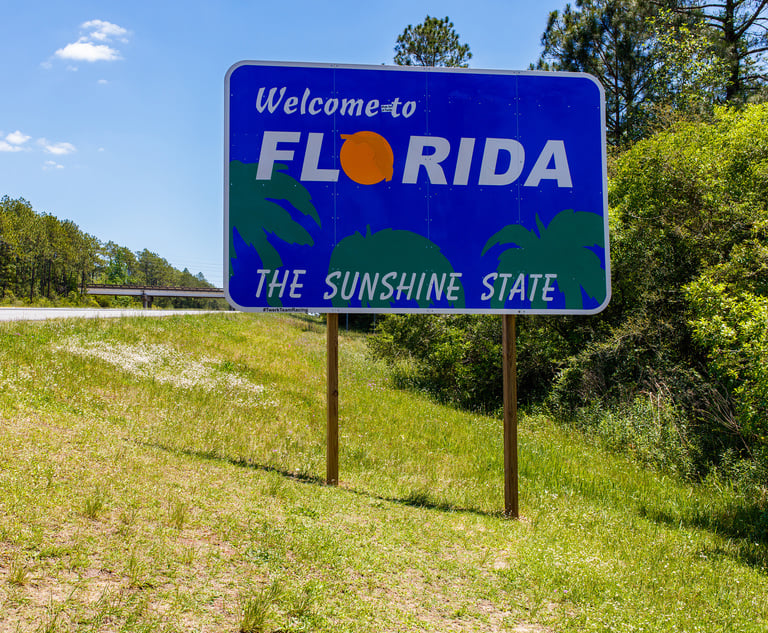 Verhonda Williams, Universal Property & Casualty Insurance. Photo: J. Albert Diaz
Verhonda Williams, Universal Property & Casualty Insurance. Photo: J. Albert DiazThe Long Road Back for Lawyers Waylaid by the Great Recession
Lawyers who graduated during and shortly after the Great Recession were confronted with layoffs and deferrals. Many are still trying to get their legal careers back on track.
June 24, 2019 at 05:30 AM
12 minute read
The original version of this story was published on The American Lawyer
Jennifer Katz remembers heading to work that day — but not much else.
She was an associate at Latham & Watkins in Los Angeles, six months into the job on that Friday morning in late February 2009.
"I remember getting an email asking if I was coming in and being very nervous as I drove in, but after that it's like a blur," she says. "I couldn't for a million dollars tell you what happened in that meeting."
Like many of her associate colleagues, Katz was laid off that day, part of a wave of separations at law firms as the credit crisis segued into the Great Recession.
Though it wasn't the first firm to make a mass layoff in the souring economy, Latham's cuts ran so deep — 190 associates and 250 staff, all at once — that they spawned a new verb. To "Latham," in the parlance of the crowdsourced Urban Dictionary, means "to kill, destroy, fire without cause or dash one's hopes and dreams."
"It wasn't a total shock," Katz says. "I certainly didn't expect it, but there were rumors going around for weeks, and everyone read about the layoffs at other firms. I don't know that I thought it would affect me personally."
But it did. Losing her job threw her off the path she'd so carefully prepared to travel: top college (University of Pennsylvania), top law school (UCLA Law Class of 2008), summer associate at Latham, then hired as a first-year associate. All was going according to plan — until it wasn't.
Aspects of Katz's unpredictable journey were shared by thousands of law school graduates from the years during and immediately after the recession, roughly 2008 through 2013. The percentage of grads who found work as lawyers right out of school in that period tumbled to the lowest levels in decades, causing many to question the value of a legal education. That, in turn, caused law school enrollment to drop and forced schools to be more transparent about their employment outcomes.
Years later, the effects are still being felt by those who graduated during the recession. The displacement of top graduates had a domino effect, as everyone downshifted to whatever work they could find, including solo practice, long-term contract review and foreclosure processing. Lawyers from less-selective law schools and those with the most debt were even worse off, forced to take low-level employment and sometimes to abandon the law altogether. For all the young lawyers who were affected by the crisis, success became a matter of perseverance, flexibility and, to some extent, luck.
Katz recalls going back to UCLA for help finding another job, only to find that the school wasn't prepared to assist students after their first clerkship or associate placement. (UCLA Law career services has since boosted its capacity for career assistance, the school says.) With student debt to pay back, she found herself scrambling for any work she could find as a lawyer. She was relieved to land at a small Beverly Hills, California, firm a couple of months later doing employment defense and general commercial work.
Katz's law school classmate and now-husband, Alexander Chemers, had better luck. His federal clerkship was unaffected by the downturn. After completing it one year after graduation, he transitioned smoothly into an associate position at an Am Law 100 firm. He sent Katz job leads, and she joined employment law giant Ogletree, Deakins, Nash, Smoak & Stewart in June 2011, where she was promoted to of counsel in April. Chemers joined her at Ogletree, where he is a shareholder, in 2015.
"Honestly, it was a really hard couple of years, but I feel like I ended up in the right place in the long term," Katz says.
As far as her experience at Latham, Katz says what most bothered her at the time was the firm's decision to defer the hiring of the class behind her for a year while firing associates in her cohort with no chance of being rehired.
"That was the only thing I felt a bit bitter about," she says. "Why did they allow people to come a year later? Why couldn't they give us that option?"
|Hard Times, Hard Decisions
Economists generally define the recession as running from December 2007 to June 2009 when the national unemployment rate rose from 5% to 9.5%. Unemployment peaked at 10% in October 2009.
The legal industry slump lasted much longer. According to U.S. Department of Labor data, legal services employment fell from a high of 1.18 million in July 2007 to 1.11 million in 2010, a drop of 70,000 jobs, or nearly 6% of the legal workforce. Despite the overall economic rebound, legal employment still hasn't returned to prerecession levels.
Data from the National Association for Law Placement shows that law school graduate placement bottomed out in 2013, several years after the national recession technically ended. The class of 2007 enjoyed a 91.9% employment rate (a 20-year high), and 76.9% of graduates got a job requiring bar passage. But the class of 2011 endured the worst legal job market since 1994 with 85.6% employment and just 65.4% of the class landing a job requiring bar passage. (By 2013, the employment rate among recent grads had slid to 84.5%.)
In fact, 2011 was the year that NALP and the American Bar Association coined the term "JD Advantage" to describe jobs in which bar passage is useful but not required. Just under half of the 2011 class got a job in private practice that year. That rate had hovered between 55% and 64% over the previous 25 years.
The hiring situation didn't really begin to improve until 2014. Even then, the rebounding rate of graduates getting law jobs was partly the result of smaller law school graduating classes between 2013 and 2016, according to Jeremy Bloom, senior vice president of the NALP Foundation for Law Career Research and Education. The impact of the recession went beyond the numbers.
"The work that was available changed fundamentally," Bloom says. "Many who wanted to do transactional work became litigators, for instance. Individuals' career trajectories were altered because of how they began and continued their careers."
Burdened by Debt
About 60% of those who graduated with a J.D. from 2010 to 2017 had at least $100,000 in student loan debt, according to one national study. For those burdened with daunting student loans, being unable to line up a good income threatened catastrophe.
Verhonda Williams of Fort Lauderdale went eight months without a job after graduating from Florida A&M College of Law in 2011, the nadir of law-grad hiring, according to the NALP Foundation. She tried supporting herself and her family as a solo before finally finding work in February 2012 in foreclosure defense litigation, which was then prevalent in Florida, ground zero for the subprime mortgage meltdown. Her six-figure debt presented a surprising stumbling block in her job search, she says.
"I even had an employer tell me that because of the amount of debt that I was in — I don't even know how that came up, I don't know how they even knew — he said, 'I would love to hire you but I don't think you would stay because you need more than I can offer,' " Williams says.
She accepted the foreclosure position hoping that it might lead to something better, but she soon discovered that potential employers weren't impressed with it. After a stint representing abused and neglected children for the state, Williams eventually found a better-paying position in insurance defense litigation. She's still heavily in debt for her education eight years out of school.
"It is so much," Williams says. "I never anticipate being able to pay it off."
Chad Van Horn, a Fort Lauderdale attorney and 2009 law school graduate who assisted Williams in discharging a bar exam loan in bankruptcy, says many young lawyers he has helped were caught in the same trap.
"The work they did was not foundational. It was contract review and pumping out template work, not critical-thinking, high-level litigation. [Some] worked for firms that got in trouble with regulators, and the work didn't help them on their resumes," Van Horn says.
Shannon Murphy, the managing director and Midwest office leader of interim legal talent at MLA in Chicago, graduated in December 2010 from Pepperdine School of Law. As a search consultant, she's seen firsthand the difficulties employers often have assessing recession-era law school graduates.
"Prerecession, there is an idea of what a person in eight to 10 years would have done, and their resumes look similar and follow a similar path. But during the recession they were not gaining that experience," Murphy says. "We have to dig down with the client as to what skills they are looking for, and similarly discuss with candidates the experience they actually gained. It makes it hard to make clear comparisons."
|A Necessary Detour
Like many attorneys who were laid off during the recession, Raghav Bajaj, University of Pennsylvania Law School Class of 2008, turned to contract work to stay employed. Unlike many, however, he went on to thrive as a partner at a big firm. He's now a member of the intellectual property practice group in the Austin, Texas, office of Haynes and Boone.
 Raghav Bajaj of Haynes and Boone.
Raghav Bajaj of Haynes and Boone.
Bajaj started his career as a patent law associate at now-defunct Dickstein Shapiro, in Washington, D.C., where he lasted through one round of layoffs before getting the ax late in 2009.
"I felt caught off guard for sure. I didn't think that it was something that would happen to me, I guess," Bajaj says. "But I came to understand that is how the world works."
To make ends meet, he became a contract lawyer, first doing document review and later more substantive work drafting patent applications at a boutique IP firm, Sterne, Kessler, Goldstein & Fox.
"I was able to pay my bills and pay my loans, so it was enough to get me through," he says. Eventually, the small firm took him on as an associate in 2010.
Friends lured the Pittsburgh native to Austin and Sutherland Asbill & Brennan, now Eversheds Sutherland, where he was hired in July 2013. He jumped to Haynes and Boone months later. In January, he became partner. Bajaj acknowledges his journey from contract lawyering is highly unusual.
"I was very worried for a large portion of that time until I had a permanent position," Bajaj admits.
|Stronger and Wiser?
Those fortunate enough to smoothly launch their careers during the Great Recession found a path to success laid out neatly before them.
"You could pretty much write your ticket for the rest of your career, because there are so few other attorneys who are similarly situated in terms of experience," Murphy says.
Layoffs and smaller classes resulted in a shortage of midlevel associates that actually increased the value of survivors, and offered opportunities to some grads who had been left out earlier.
Some grads were gifted a second chance by the circumstances. Even so, that doesn't mean the lucky ones were completely unscathed. Some say a feeling of insecurity persisted long afterward.
Chemers, Katz's husband who landed at an Am Law 100 firm right out of his clerkship, emerged with two economic priorities: saving up a rainy-day fund in case he lost his job and paying down student debt as quickly as possible in case he couldn't find work as a lawyer in the future.
He recalls a sense of powerlessness among recent grads and junior associates at the time, though he feels the pendulum has since swung back in their favor.
Emily Bianchi, an associate professor of organization and management at Emory University Goizueta Business School, studies how economic conditions in early adulthood influence later job attitudes and behavior. In a Harvard Business Review article last fall, she cited her own and others' research that found well-educated people who graduated from college during recessions on the whole earned less money and tended to work for smaller, less prestigious and lower-paying firms even decades later. But they were more satisfied than those who graduated in better times, and appeared to be less narcissistic as a group.
Katz retains an optimistic outlook, acknowledging that she and her husband had much different journeys to reach the same destination.
"You get where you want to be eventually and will find the place that is right for you if you keep doing it," Katz says. "You can certainly accomplish your goals as long as you stick with them."
Email: [email protected]
This content has been archived. It is available through our partners, LexisNexis® and Bloomberg Law.
To view this content, please continue to their sites.
Not a Lexis Subscriber?
Subscribe Now
Not a Bloomberg Law Subscriber?
Subscribe Now
NOT FOR REPRINT
© 2024 ALM Global, LLC, All Rights Reserved. Request academic re-use from www.copyright.com. All other uses, submit a request to [email protected]. For more information visit Asset & Logo Licensing.
You Might Like
View All
Anticipating a New Era of 'Extreme Vetting,' Big Law Immigration Attys Prep for Demand Surge
6 minute read
Zero-Dollar Verdict: Which of Florida's Largest Firms Lost?

Florida-Based Law Firms Start to Lag, As New York Takes a Bigger Piece of Deals
3 minute read
Trending Stories
- 1Deception or Coercion? California Supreme Court Grants Review in Jailhouse Confession Case
- 2State Bar of Georgia Presents Access to Justice Pro Bono Awards
- 3Tips For Creating Holiday Plans That Everyone Can Be Grateful For
- 4Red Tape, Talent Wars & Pricey Office Space Greet Firms Entering Saudi Arabia
- 5A Funny Thing Happened on the Way to Becoming Clerk of the Forum
Who Got The Work
Michael G. Bongiorno, Andrew Scott Dulberg and Elizabeth E. Driscoll from Wilmer Cutler Pickering Hale and Dorr have stepped in to represent Symbotic Inc., an A.I.-enabled technology platform that focuses on increasing supply chain efficiency, and other defendants in a pending shareholder derivative lawsuit. The case, filed Oct. 2 in Massachusetts District Court by the Brown Law Firm on behalf of Stephen Austen, accuses certain officers and directors of misleading investors in regard to Symbotic's potential for margin growth by failing to disclose that the company was not equipped to timely deploy its systems or manage expenses through project delays. The case, assigned to U.S. District Judge Nathaniel M. Gorton, is 1:24-cv-12522, Austen v. Cohen et al.
Who Got The Work
Edmund Polubinski and Marie Killmond of Davis Polk & Wardwell have entered appearances for data platform software development company MongoDB and other defendants in a pending shareholder derivative lawsuit. The action, filed Oct. 7 in New York Southern District Court by the Brown Law Firm, accuses the company's directors and/or officers of falsely expressing confidence in the company’s restructuring of its sales incentive plan and downplaying the severity of decreases in its upfront commitments. The case is 1:24-cv-07594, Roy v. Ittycheria et al.
Who Got The Work
Amy O. Bruchs and Kurt F. Ellison of Michael Best & Friedrich have entered appearances for Epic Systems Corp. in a pending employment discrimination lawsuit. The suit was filed Sept. 7 in Wisconsin Western District Court by Levine Eisberner LLC and Siri & Glimstad on behalf of a project manager who claims that he was wrongfully terminated after applying for a religious exemption to the defendant's COVID-19 vaccine mandate. The case, assigned to U.S. Magistrate Judge Anita Marie Boor, is 3:24-cv-00630, Secker, Nathan v. Epic Systems Corporation.
Who Got The Work
David X. Sullivan, Thomas J. Finn and Gregory A. Hall from McCarter & English have entered appearances for Sunrun Installation Services in a pending civil rights lawsuit. The complaint was filed Sept. 4 in Connecticut District Court by attorney Robert M. Berke on behalf of former employee George Edward Steins, who was arrested and charged with employing an unregistered home improvement salesperson. The complaint alleges that had Sunrun informed the Connecticut Department of Consumer Protection that the plaintiff's employment had ended in 2017 and that he no longer held Sunrun's home improvement contractor license, he would not have been hit with charges, which were dismissed in May 2024. The case, assigned to U.S. District Judge Jeffrey A. Meyer, is 3:24-cv-01423, Steins v. Sunrun, Inc. et al.
Who Got The Work
Greenberg Traurig shareholder Joshua L. Raskin has entered an appearance for boohoo.com UK Ltd. in a pending patent infringement lawsuit. The suit, filed Sept. 3 in Texas Eastern District Court by Rozier Hardt McDonough on behalf of Alto Dynamics, asserts five patents related to an online shopping platform. The case, assigned to U.S. District Judge Rodney Gilstrap, is 2:24-cv-00719, Alto Dynamics, LLC v. boohoo.com UK Limited.
Featured Firms
Law Offices of Gary Martin Hays & Associates, P.C.
(470) 294-1674
Law Offices of Mark E. Salomone
(857) 444-6468
Smith & Hassler
(713) 739-1250






